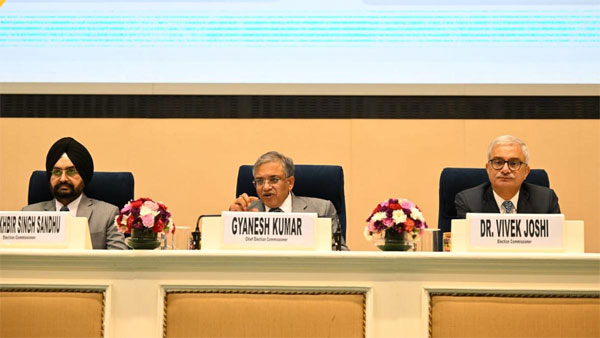Daijiworld Media Network - New Delhi
New Delhi, Oct 6: The Election Commission of India (ECI) has officially announced that the Bihar Assembly elections will take place in two phases — on November 6 and November 11 — with the results to be declared on November 14. The announcement, made by Chief Election Commissioner Gyanesh Kumar, marks the beginning of what he described as the “mother of all elections.”
This will be Bihar’s first Assembly election since the major overhaul of its voter rolls under a Special Intensive Revision (SIR) conducted after 22 years. The updated electoral list features 7.43 crore voters, including 14 lakh first-time electors. The final rolls have been shared with all political parties, and corrections can still be requested until 10 days before the nomination deadline.

To boost transparency and efficiency, each of Bihar’s 243 constituencies will now have its own observer, a shift from the previous system where one observer handled multiple seats. The ECI also plans to tackle misinformation, particularly on social media, through monitoring cells at the district level.
The polling schedule has been carefully aligned to avoid major festivals like Diwali and Chhath, expected to encourage maximum voter participation. With the term of the current Assembly expiring on November 22, the timeline ensures a seamless transition.
The 2025 elections are shaping up to be a high-stakes political showdown. The ruling BJP–JD(U) alliance will face a stiff challenge from the Mahagathbandhan, led by the RJD and Congress. Adding intrigue to the contest is the emergence of Prashant Kishor’s Jan Suraaj Party, which aims to disrupt the traditional bipolar narrative of Bihar politics.
In the 2020 elections, the NDA secured 125 seats, narrowly beating the Mahagathbandhan’s 110, with the RJD emerging as the single largest party. Voter turnout stood at 56.93%, a notable figure given that it was the first major election post-COVID-19.
This year, to improve the voting experience, the ECI has reduced the number of voters per polling booth from 1,500 to 1,200. To accommodate this change, around 90,000 polling stations will be set up across the state. The expanded infrastructure will be supported by increased deployment of Central Armed Police Forces to ensure smooth and secure polling.